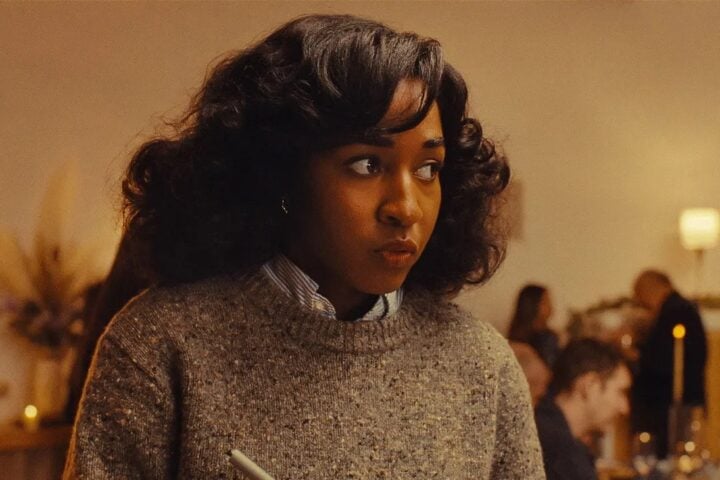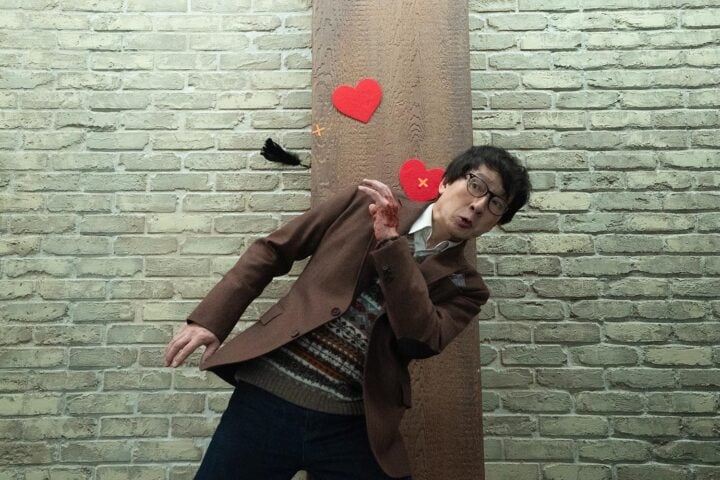Emma Seligman’s Shiva Baby drew from the well of modern cringe comedies to tell its story of a pressure cooker of a shiva. That setting lent the film authenticity, keeping it firmly grounded in a recognizable reality. So it’s all the more surprising that Seligman’s follow-up, Bottoms, is a far more silly, over-the-top affair, but the film’s unique blend of deadpan and absurdist humor, and its tendency to occasionally push the boundaries of good taste, shows that Seligman is equally comfortable working at the opposite end of the comic spectrum.
Following queer high school besties P.J. (Rachel Sennott) and Josie (Ayo Edebiri) as they start a fight club in an attempt to impress two cheerleaders, Isabel (Havana Rose Liu) and Brittany (Kaia Gerber), Bottoms immediately announces itself as a warped reimagining of the high school comedy rather than a straightforward satire of one. Its kinship, then, is less with films like Mean Girls or Easy A than uncanny, through-the-looking-glass cult comedies such as Wet Hot American Summer, Heathers, and Strangers with Candy—only bloodier and hornier.
P.J. and Josie’s close friendship is the glue that holds the film together, and Sennott’s brash, overconfident demeanor plays perfectly against Edebiri’s charmingly clumsy bashfulness. The actors’ chemistry was already fully formed in their three-episode Comedy Central web series Ayo and Rachel Are Single, and their comic timing here, whether they’re spouting rapid-fire dialogue or performing pratfalls and increasingly violent visual gags, is impeccable.
Sennott and Edebiri are aided by a strong ensemble cast, each of whom brings their own distinctive comic flair to the proceedings. The most noteworthy is Nicholas Galitzine, whose brainless fuckboi quarterback exhibits both privilege and fragility (mental and physical) in such outrageous extremes that he instantly becomes one of the most memorable himbo airheads since Brad Pitt in Burn After Reading. An inspired scene in which Galitzine’s Jeff giddily dances, oblivious to the world around him, to a needle drop too perfect to spoil here nearly tops the spasmodic and instantly meme-able dance moves Pitt performs in the Coen brothers’ film.
As with most absurdist comedies, Bottoms’s steady stream of jokes and gags is somewhat inconsistent, and its late-in-the-game stabs of pathos clash awkwardly with the cacophonous, off-kilter tone that the film carefully sustains for much of its runtime. In between, the attempts at commenting on fake feminism, macho male rituals, fluid sexuality, and jealousy also never quite cut to the bone. But the jokes about self-serving allyship and the insecurities that aggressive masculinity often masks come so nimbly out of leftfield that the surprising and clever nature of the punchlines makes up for the lack of insightful commentary.
Ultimately, it’s the go-for-broke energy that Seligman and her cast inject into Bottoms that makes it so infectious. Wisely, the actors play things straight even when things are at their most outlandish. P.J. and Josie, for one, remain unfazed when Mr. G (Marshawn Lynch), an exceedingly inappropriate teacher and sponsor of the fight club, browses a smut mag right in front of them and their principal (Wayne Péré) refers to them as “the unpopular gays.”
One of the most amusing recurring jokes in the film involves the members of the school’s football team wearing their pads at all times, even during class. The way in which the weird is perceived as perfectly normal throughout Bottoms comes to feel more subversive as the consequences for cheating on one’s girlfriend and antagonizing a football player turn deadly. If the climax, set during the team’s big game, isn’t quite the patriarchy-toppling moment that some viewers may crave, its pure, inspired lunacy picks up the slack. And the film’s extolling of female solidarity finally does strike a chord here, and without sacrificing the laughter.
Since 2001, we've brought you uncompromising, candid takes on the world of film, music, television, video games, theater, and more. Independently owned and operated publications like Slant have been hit hard in recent years, but we’re committed to keeping our content free and accessible—meaning no paywalls or fees.
If you like what we do, please consider subscribing to our Patreon or making a donation.





